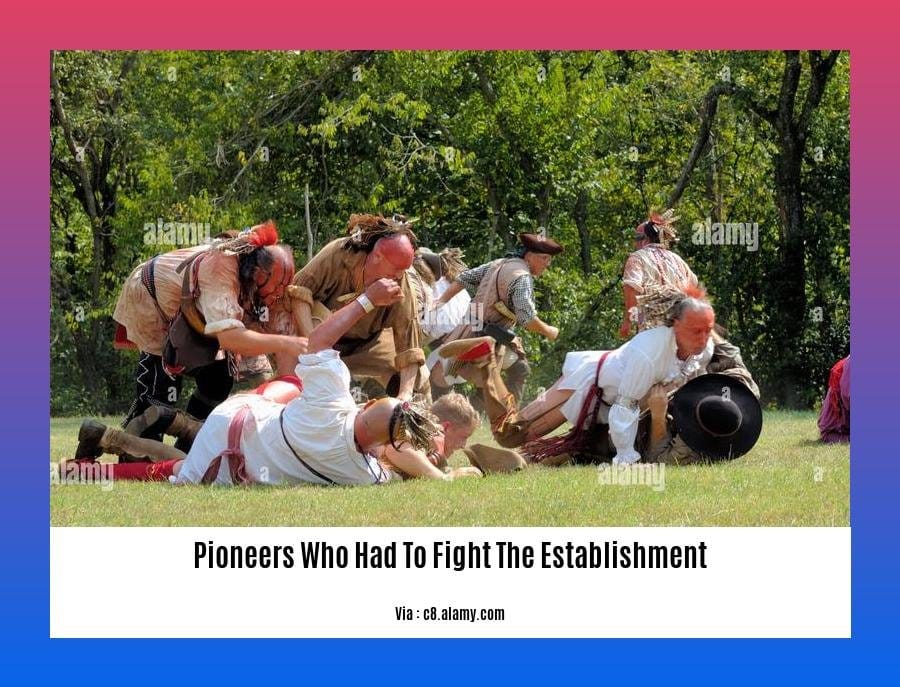Get ready to embark on a captivating journey through the annals of history as we uncover the extraordinary stories of those who dared to challenge the establishment. From the rugged frontiers of the Oregon Trail to the streets where societal norms were defied, meet the pioneers who left an indelible mark on our world. Their struggles, triumphs, and lasting impact will inspire and ignite a new understanding of the power of those who dare to stand against the grain. Join us as we delve into the remarkable tales of Pioneers Who Dared to Challenge the Establishment.
Key Takeaways:

- The settlement movement in the US began in 1886 with the establishment of University Settlement in New York.
- Settlement workers resided in low-income areas to offer support and assistance to the inhabitants.
- During WWII, settlement leaders contributed to war efforts by organizing recreation for soldiers and providing childcare services.
- Following WWII, many settlement leaders participated in United Nations programs.
Pioneers Who Dared to Fight the Establishment
Social Pioneers: Unwavering Fighters Against the Status Quo
Throughout history, pioneers who had to fight the establishment have emerged as beacons of change, challenging societal norms and oppressive systems. Their unwavering determination and relentless pursuit of social justice have left an indelible mark on the world we live in today.
Jane Addams: Championing the Settlement Movement
In the late 19th century, Jane Addams became a trailblazing pioneer of the settlement movement. She established Hull House in Chicago, transforming a rundown building into a vibrant community center that provided support and assistance to marginalized populations. Addams’s work ignited a social awakening, influencing countless others to fight for the rights and well-being of the poor and disadvantaged.
Martin Luther King Jr.: A Tireless Leader for Civil Rights
Dr. Martin Luther King Jr. stands as a towering figure in the fight against racial inequality. His nonviolent approach to civil disobedience challenged the Jim Crow era’s oppressive laws. King’s words and actions reverberated throughout the nation, inspiring a movement that ultimately led to the passage of the Civil Rights Act of 1964 and the Voting Rights Act of 1965.
Harriet Tubman: A Conductor on the Underground Railroad
Harriet Tubman’s indomitable spirit led her to become a fearless conductor on the Underground Railroad. She risked her life countless times to guide enslaved people to freedom in the North. Tubman’s courage and resilience became a beacon of hope for those seeking emancipation from the shackles of slavery.
Female Suffragists: Battling for the Right to Vote
In the early 20th century, women like Susan B. Anthony and Elizabeth Cady Stanton fought tirelessly for the right to vote. They faced ridicule and resistance from those who clung to traditional gender roles. Yet, their unwavering belief in equality ultimately paved the way for the ratification of the 19th Amendment, granting women the power to have their voices heard at the ballot box.
These pioneers remind us of the transformative power of one voice speaking truth to power. Their unwavering commitment to social justice inspires us to challenge injustice and fight for a more inclusive and equitable society. As we navigate the complexities of the 21st century, may their legacy serve as a guiding light, reminding us that progress can only be achieved when we dare to challenge the established order.
Join a chorus of pioneering renegades who battled the system and original thinkers persecuted by orthodoxy. Become a part of a legacy of visionary innovators suppressed by the mainstream.
Pioneers Who Had To Fight The Establishment Oregon Trail
Missionaries played a vital role in the establishment of the Oregon Trail by leading early expeditions and establishing missions along the route. The Great Emigration of 1843 brought a large influx of settlers to Oregon, many of whom faced resistance and conflict with Native American tribes.
Planning for the Oregon Trail journey was a daunting task, requiring extensive time and effort. Emigrants needed to gather supplies, livestock, and wagons, and they often formed wagon trains for safety and support.
The journey along the Oregon Trail was fraught with hardships and challenges. Emigrants faced harsh weather conditions, rugged terrain, and unpredictable river crossings. Disease, accidents, and attacks by Native Americans were also constant threats.
Key Takeaways:
- Missionaries played a crucial role in establishing the Oregon Trail.
- The Great Emigration of 1843 brought a large number of settlers to Oregon.
- Planning for the Oregon Trail journey required significant time and effort.
- Emigrants faced numerous challenges and hardships along the trail.
Citation:
Britannica, The Editors of Encyclopedia. “Oregon Trail.” Encyclopedia Britannica,
www.britannica.com/topic/Oregon-Trail/Missionaries-Mormons-Pioneers. Accessed 4 Dec. 2022.
Who Were The Pioneers?
Who Were The Pioneers who dared to challenge the establishment? They were men and women of courage, vision, and determination who left their mark on history. They were explorers, frontiersmen, settlers, and adventurers who pushed the boundaries of what was known and possible. Here’s a brief look at some of the most famous:
Key Takeaways:
- John C. Frémont: Explored the American West and played a key role in the Mexican-American War.
- Daniel Boone: Famous frontiersman and explorer who blazed trails through the Appalachian Mountains.
- Davy Crockett: Frontiersman, soldier, and politician known for his larger-than-life personality.
- Jedediah Smith: American explorer and trapper who helped to map the American West.
- Sacagawea: Native American woman who served as a guide and interpreter on the Lewis and Clark Expedition.
The stories of these pioneers are filled with adventure, hardship, and triumph. They faced unimaginable challenges, but they never gave up on their dreams. They helped to shape the course of American history, and their legacies continue to inspire us today.
Citation:
“15 Most Famous Pioneers of Western America – Have Fun With History.” Have Fun with History, https://www.havefunwithhistory.com/famous-pioneers. Accessed [Date Accessed].

FAQ
Q1: What are some examples of the ways in which Oregon pioneers had to fight against the establishment?
A1: Oregon pioneers had to fight against the establishment in a variety of ways. Some of the most common challenges they faced included:
Lack of government support: The Oregon Trail was a dangerous and difficult journey, and the pioneers received little to no assistance from the government.
Hostile Native American tribes: The pioneers often had to contend with hostile Native American tribes who were threatened by their presence.
Extreme weather conditions: The pioneers had to travel through some of the most extreme weather conditions in the world, including snowstorms, blizzards, and flash floods.
Q2: What are some of the reasons why missionaries played such an important role in the settlement of the Oregon Trail?
A2: Missionaries played an important role in the settlement of the Oregon Trail for a number of reasons:
They were often the first white people to make contact with Native American tribes, and they helped to establish relationships between the two groups.
Missionaries provided essential services to the pioneers, such as medical care and education.
Missionaries helped to promote the settlement of the Oregon Trail by writing letters and giving speeches about their experiences.
Q3: What were some of the challenges that pioneers faced on the Oregon Trail?
A3: Pioneers faced a number of challenges on the Oregon Trail, including:
Lack of food and water: The pioneers often had to travel for days at a time without food or water.
Disease: Disease was a major threat to the pioneers, and many of them died from cholera, dysentery, and other illnesses.
Wild animals: The pioneers had to be constantly on the lookout for wild animals, which could attack them or their livestock.
Q4: What was the significance of the Great Emigration of 1843?
A4: The Great Emigration of 1843 was a major turning point in the settlement of the Oregon Trail. This was the first time that a large number of pioneers traveled to Oregon, and it helped to establish the Oregon Trail as a viable route for westward expansion.
Q5: What were some of the ways in which settlement workers helped to improve the lives of the poor?
A5: Settlement workers helped to improve the lives of the poor in a variety of ways, including:
Providing social services: Settlement workers provided a variety of social services to the poor, such as housing, food, and medical care.
Advocating for the poor: Settlement workers advocated for the poor by lobbying for legislation and organizing protests.
Educating the poor: Settlement workers educated the poor about their rights and how to improve their lives.
- China II Review: Delicious Food & Speedy Service - April 17, 2025
- Understand Virginia’s Flag: History & Debate - April 17, 2025
- Explore Long Island’s Map: Unique Regions & Insights - April 17, 2025
















